By Melissa Mullins
Anyone who’s been around Waco for very long has no doubt noticed the remarkable growth and development occurring, with everything from home construction to hotel revenue on the rise. All the new construction I see around me daily got me to wondering: how do cities around Texas and around the country encourage “green” infrastructure and what’s planned for Waco?
Sustainable Development
Sustainable development is loosely defined as meeting the needs of the present without compromising the ability to meet future needs. It is often discussed in terms of the ubiquitous “three-legged stool” metaphor with strong economic, environmental and social legs (people, planet, profit) all required if you don’t want a wobbly stool. Since my background is in biology (and not economics or social sciences), I wonder most about interactions of the natural and the built environment when communities grow.
In my neighborhood and around Texas
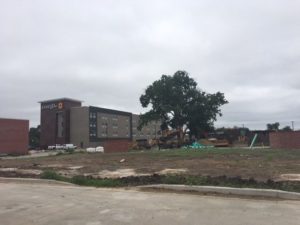 So, for instance, as the city block (pictured) that I pass by daily was converted from older houses to a new shopping center this year, what changes will take place in terms of water movement, soil, and plants? How can we capitalize on the new structures that are in place (such as rooftops)? Waco has lots of great outdoor green spaces- but are there things we can do to promote linkages and greenbelts in our community? I don’t claim to know the answers to these questions, but I do think we all should be a part of the conversation. And it’s a conversation that is not unique to Waco. About 85% of Texans currently live in urban areas, and the population of Texas’ cities is expected to double in the next 40 years, with metropolitan counties (including ours) accounting for nearly all the growth that will occur in the state.
So, for instance, as the city block (pictured) that I pass by daily was converted from older houses to a new shopping center this year, what changes will take place in terms of water movement, soil, and plants? How can we capitalize on the new structures that are in place (such as rooftops)? Waco has lots of great outdoor green spaces- but are there things we can do to promote linkages and greenbelts in our community? I don’t claim to know the answers to these questions, but I do think we all should be a part of the conversation. And it’s a conversation that is not unique to Waco. About 85% of Texans currently live in urban areas, and the population of Texas’ cities is expected to double in the next 40 years, with metropolitan counties (including ours) accounting for nearly all the growth that will occur in the state.
Waco City Plan
There is certainly no shortage of information on the internet about “greening cities” around the country and around the world. Closer to home, The Waco City Council adopted the City Plan, Waco Comprehensive Plan 2040 a couple of years ago, and this plan discusses specifics for Waco related to economic development, growth management, transportation, community livability and the environment. In addition to outlining broad goals and objectives for Waco, specific implementation strategies are identified related to sustainable growth. For instance, City Ordinances could be adopted such as a parkland ordinance that would require developers to contribute to construction of parks, and creek beds could be developed as linear parks that could link neighborhoods to the Brazos River Corridor. There are recommendations to adopt stormwater utility fees that would encourage green infrastructure. The section of the plan on the Environment contains implementation strategies aimed at reducing impervious cover, conserving water, and encouraging sustainable planting practices using native plants. Some of the most exciting implementation strategies are related to energy and encourage considering the adoption of a green building code, promoting the use of solar power in residential, commercial, and industrial development, and taking specific actions to decrease the urban heat island effect.
What can I do?
A city plan is only a starting point of course, and only as good as the action that comes from it. There are other entities besides government (such as non-profits) that play an integral part in advocating for all three legs of sustainable growth in Waco and surrounding communities. How can interested citizens be involved? We are often given lists of individual actions we can take that are sustainable (recycling, taking our own bags to the grocery store, etc.) and while these are all great ideas, our real strength and ability to promote sustainability is as a community, which is more than a loose affiliation of individuals doing their own “green” thing. So maybe for me that means forcing myself to go to public meetings (though I hate them) where issues I care about are on the agenda. What does it mean for you? Some places to look for inspiration might include: Keep Waco Beautiful, the Waco Sustainable Resource Practices Advisory Board, Sustainable Waco Facebook group, Heart of Texas Master Naturalists, McLennan County Master Gardeners – feel free to share others you know about in the comments section!
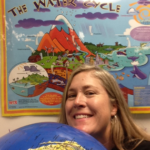 Melissa Mullins coordinates water education and outreach at Baylor’s Center for Reservoir and Aquatic Systems Research. She’s lived in various neighborhoods in Waco and McLennan Co over the last 25 years, loves spending time outside, and is a library patron.
Melissa Mullins coordinates water education and outreach at Baylor’s Center for Reservoir and Aquatic Systems Research. She’s lived in various neighborhoods in Waco and McLennan Co over the last 25 years, loves spending time outside, and is a library patron.
The Act Locally Waco blog publishes posts with a connection to these aspirations for Waco. If you are interested in writing for the Act Locally Waco Blog, please email [email protected] for more information.
(This post is a part of a regular series “Trails & Trials,” a monthly adventure series inspiring others to experience the physical, mental, and social benefits of cycling, running or swimming in Central Texas. For more posts in this series, click here: Trails and Trials. – ALW)
By Natasha van der Merwe
Last weekend we had the pleasure of hosting over 60 athletes in Waco. They came in from cities all across Texas, Oklahoma and Arkansas, for the inaugural Bicycle World IRONMAN® 70.3® Waco training camp.
What exactly does a Triathlon training camp entail?
This camp was specifically targeted at helping athletes feel as prepared as possible for the inaugural IRONMAN® 70.3® Waco Triathlon on October 28th.
The first goal was to familiarize the athletes with the race course. The second goal was to make sure every athlete left with as much information on how to execute all the small but important elements that would make their race day a success. We covered topics such as day-to-day nutrition, race day nutrition, race day pacing, carb-loading, taper week protocols, cycling equipment, and much more. All elements are just as important as the other.
Outside of these two goals for the athletes, an added bonus is that a triathlon community was built.
There is nothing like getting a group of like minded, and enthusiastic people in the same room conversing about their favorite subject – triathlon. The conversation flowed and many new friends were made.
The camp started on Saturday mid-morning, where we took athletes through a transition clinic. The quickest way to transition from the 1.2 mile swim to the 56 mile bike ride, and from the bike ride to the 13.1 mile run.
Transition times are important, as they add to one’s overall time. We showed the athletes a few tips and tricks to make the process as time efficient as possible.
Athletes were advised as to what a pre-workout and race warm up routine should look like. This included activation exercises, specifically targeted at getting muscles ready for the upcoming activities, as well as running specific drills focused on building running efficiency and making sure we have the body feeling loose and ready for the workout session or race ahead.
Following our activation exercises and warm up we sent the athletes off to run part of the IRONMAN® 70.3® Waco run course, which ran them on a beautiful and mostly shaded path along the Brazos River.
Thanks to the volunteers from the Waco Triathlon Club for all their assistance. They ensured that the campers had a great impression of Waco. We had water stops along the route for them to stop, chat and take in the views before heading back.
Next on the agenda was a group swim at the beautiful Waco Family YMCA pool. Our group was so large that we had to split them in two groups. Aaron Shapley, a Bicycle World Racing Team athlete and an ex collegiate swimmer, gave an informational session in the bleachers. I then took a group through their paces of a triathlon specific workout that can be done in the pool.
After a short break, all the athletes got together at Downtown 301, which is located right behind the new Bicycle World store. Athletes got to mingle with others over a steak and sweet potato dinner, which we recommend prior to big races due to its nutrient density, which is perfect in preparing the body for a big event.
Bicycle World’s CEO and President, Todd Behringer, and local triathlete Erik Romanov took us through the bike and run courses so that athletes got familiar with the course before riding and running it the following day. I then got the opportunity to speak on several topics and details that would help them make their race day as enjoyable as possible.
Sunday morning, while the athletes were enjoying breakfast, our volunteers setup course signage and aid stations on the bike and run course. When athletes arrived in the morning, they setup their transition in the IRONMAN® 70.3® Waco transition area. We then set athletes off in various pace groups led by the Waco triathlon community and Bicycle World Racing team. All campers got to ride the entire 56 mile bike course which is described on the Ironman website as a single-loop course through the scenic Central Texas rural roads.
The day finished with running one loop of the challenging two loop run course that takes athletes along the Brazos River and into the hills of Cameron Park, and finishing on the suspension bridge which offers a picture perfect and memorable finish line.
After the ride and run, athletes, coaches, and volunteers all congregated under tents enjoying a well-deserved and delicious lunch from Luna Juice, while reminiscing about their big training weekend. One of our athletes, who was brand new to the sport of triathlon, finished the day in tears of joy. She exclaimed how proud she was of herself because never in a million years did she think that she was capable of doing a triathlon. It was her longest ride and run to date, and training for IRONMAN® 70.3® Waco was the big goal that kept her mind off recent heartbreak she had experienced in her life. Like many of us that enjoy the sport, training for a triathlon had given her day purpose, and she was proving to herself that she was strong enough to handle anything that came her way.
We all come to the sport of triathlon for one reason or another. Mine started out as simply needing a bigger purpose to workout and take care of myself, other than just to look or feel good.
Well, I got this and so much more…
- It turned into an Enduring Passion.
- It improved my overall quality of life.
- It became a career that allows me to compete and help others on their journey through the sport.
- It created new and long-lasting friendships within a close-knit community.
- Lastly, training for a triathlon and race day brought about joy and living life to the fullest.
It is a great experience when crossing that finish line at the end of a race. Months and months of preparation are celebrated.
I personally cannot wait to see the many tears and exclamations of joy from nearly 3000 triathletes on that suspension bridge on October 28th.
 Natasha van der Merwe is originally from South Africa. She is mom to a 19-month old girl, former professional tennis player and tennis instructor, and a professional triathlete representing Bicycle World and Waco Running Company. She has multiple top 10 finishes in Ironman and 70.3 events around the world. She is Director of Team Programs for Bicycle World, Texas
Natasha van der Merwe is originally from South Africa. She is mom to a 19-month old girl, former professional tennis player and tennis instructor, and a professional triathlete representing Bicycle World and Waco Running Company. She has multiple top 10 finishes in Ironman and 70.3 events around the world. She is Director of Team Programs for Bicycle World, Texas
The Act Locally Waco blog publishes posts with a connection to these aspirations for Waco. If you are interested in writing for the Act Locally Waco Blog, please email [email protected] for more information.
By Jessica Maxwell
In July 2015, Waco Transit System assumed operations of the newly-formed McLennan County Rural Transit District (MCRTD). MCRTD offers appointment-based, door-to-door service that anyone can use to travel anywhere in McLennan and adjacent counties. The program, which replaced a former rural program operated by another agency, was created to improve the mobility of rural residents and enhance access to jobs, education, community services, healthcare and more. Public transportation was previously not an option for most people in these rural areas, due to limited service.
“By combining the urban and the rural systems to one provider, we’ve been able to maximize our efficiencies, which has allowed us to extend service hours and create Saturday service,” said Waco Transit System General Manager, Allen Hunter. “This program gives people who don’t have transportation a chance to lead independent lives – and we’re just glad to be a part of that.”
Take, for example, rural transit passenger, Jerry Kucera. Mr. Kucera is unable to drive and uses rural transportation every day during the week to get to his job in Waco at Goodwill. He lives at home with his parents in West, and his mother, Dorothy, said the service has been a “godsend” to their family.
“My husband cannot drive anymore, because he’s on oxygen 24/7, and I needed somebody to help me with the driving,” said Mrs. Kucera. “The drivers handle him [Jerry] with kid-glove care, they’re there on time, and they make sure he gets to work on time.”
Public outreach has been instrumental in generating awareness on MCRTD and educating on rural transportation’s affordability and ease of use. To help promote the program even more, MCRTD partnered with Texas country music artist, Holly Tucker, to create an eye-catching TV commercial and full-length PSA.
- Link to award-winning, full-Length “Anyone. Anywhere.” PSA: https://youtu.be/SJB_KKx7SHw
- Link to award-winning, :30 “Anyone. Anywhere.” commercial: https://youtu.be/eponEyXXWGU
MCRTD has grown exponentially and continues to flourish. The service provided more than 54,000 trips in 2017 and experienced 114% growth from the previous calendar year. This year, MCRTD is projected to transport more than 63,000 passengers. Ridership has increased above expectation, and transit officials expect those numbers to rise even more as word continues to spread about the program.
Additionally, MCRTD was named the “2018 Outstanding Rural Transit System of the Year” by the Texas Transit Association. This award is given out each year to an agency in the state of Texas that displays exemplary service in the transportation industry.
“In a time when ridership has been declining in the state and in rural transportation, our ridership has actually gone up each year,” said Mr. Hunter. “We’ve worked very hard to grow this program, and we’re excited for what the future holds.”
Rural transit service is available from 5:15 a.m. to 7:15 p.m., Monday through Friday, and 6:15 a.m. to 8:15 p.m., on Saturday. Trips can be arranged by calling Waco Transit System at least 24 hours in advance at (254) 750-1620 or 877-875-RIDE (7433). Fare for one-way, in-county trips is $3.00, and fare for one-way, adjacent-county trips is $5.00. Fees also apply for guests. Destinations include anywhere in McLennan or adjacent counties, as long as one leg of the scheduled trip originates from, or travels to, a rural address.
For more information about the McLennan County Rural Transportation District program, call (254) 750-1620. Additional information can also be found on the Waco Transit System website at http://www.waco-texas.com/transit/rural_transit.asp.
 Jessica Maxwell is the Director of Marketing for Waco Transit System. She graduated from Northern Illinois University with a BA in Journalism and Communication Studies. Originally from Illinois, she moved to Texas with her husband in 2013, and they have been happily settled in Waco ever since. She enjoys spending time with her family, traveling and experiencing all the great outdoors has to offer. You can reach Jessica at [email protected].
Jessica Maxwell is the Director of Marketing for Waco Transit System. She graduated from Northern Illinois University with a BA in Journalism and Communication Studies. Originally from Illinois, she moved to Texas with her husband in 2013, and they have been happily settled in Waco ever since. She enjoys spending time with her family, traveling and experiencing all the great outdoors has to offer. You can reach Jessica at [email protected].
The Act Locally Waco blog publishes posts with a connection to these aspirations for Waco. If you are interested in writing for the Act Locally Waco Blog, please email [email protected] for more information.
(Welcome to the Act Locally Waco/Towny blog series. Towny is an app that exists to connect consumers with local businesses. It’s fairly new to Waco and is loaded with answers to the question, “Why local?” Through this blog series, the folks at Towny will be sharing the stories behind some of our high-quality, local products and helping you get to know some of our energetic local entrepreneurs. We hope you enjoy it! Supporting local business is a terrific way to support the Waco economy! Plus, it’s just fun to get to know your neighbors. For more posts in this blog series, click here: Towny Waco.– ALW)
by Beth Whittington
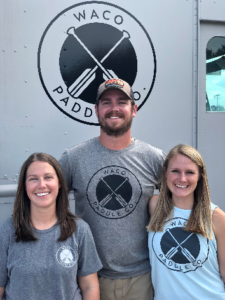
Sarah Raley, Ross + Beth Harris
Ross and Beth Harris have considered Waco their permanent home since 2003. Ross was with a store called Outdoor Waco. Bicycle World bought Outdoor Waco and then sold the water rentals part of the business to Ross and Beth 2016. The couple, along with Beth’s sister, Sarah Raley, rebranded the business as Waco Paddle Company.
All three of them had an interest in the outdoors – we’re talking rock climbing, camping, mountain biking, swimming, canoe and stand-up paddling. Beth was an outdoor recreation major at Baylor (Ross and Sarah’s alma mater as well!) Before she and Ross had their first child in 2015, she had been the Director of Recreational Services at Methodist Children’s Home for five years. Between her experience and Ross’s experience with Outdoor Waco, it seemed like a great opportunity.
We met up with Sarah Raley, to learn more about the business of the Brazos. What we didn’t know was – for Sarah, there is waaay more behind the word “marine” than water sports. Here’s a gorgeous example of local leadership AND the, no doubt, interesting journey of this mother of two.
Sarah, how did you get involved in Waco Paddle Company?
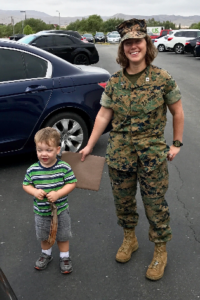
Sarah on her last day in the military!
“I came to Baylor in 2005. My husband, too…We left for me to go to law school in Austin. I joined the Marine Corps and I was a judge advocate — I was a lawyer in the Marine Corps — up until last year in Okinawa, Japan. We visited Texas before we permanantly moved back to the States. We were in Austin and Dallas and Waco, and we were just like – man, Waco is such a great place.
We really feel strongly that Waco Paddle Company can add value to people’s lives. Get them outdoors. It’s fun and relaxing; it’s adventurous. It’s an activity, exercise and you don’t even mean it to be. Sometimes when you’re on the water it feels like you’re by yourself. There’s nothing else going on. It’s a fun thing to be a part of. No one gets off the water, and comes back in upset or disappointed.”
Did you enjoy your time in the military?
“It was a very interesting, very valuable thing to go through, though there were certainly parts of it I didn’t enjoy. I was prosecuting a sexual assault case and our judge was a reserve colonel getting his reserve time by coming over and presiding over some of our cases.
It turned out that he was an assistant U.S. attorney in Austin. He said, the kind of cases you just prosecuted, you would have had to be in my office for 10 years to have even been a fourth seat on a case like this and you’re getting to do it. Overall, the experience was very, very good.”
So, being a part of the community sounds like a huge value to Waco Paddle Company?
“We try to be involved in anything that makes sense as a watercraft rental business on the Brazos… When there are events on the water like TriWaco or Sharkfest, we provide kayaks for the lifeguards.
We do a quarterly river clean up with Keep Waco Beautiful where they bring in loads and loads of volunteers.
We want to be stewards of the river. We want people to appreciate and care for not only the Brazos but Texas waterways in general, so we want to be involved in that.
Our dock is going to be the entry point for the swim portion of the IronMan!”
And you guys do all this with four kids under three years old!
“Maybe that’s the reason. We all need something to pour our intellectual energy into because we’re dealing with little kids all the time!”
What does Waco Paddle offer the community, specifically?
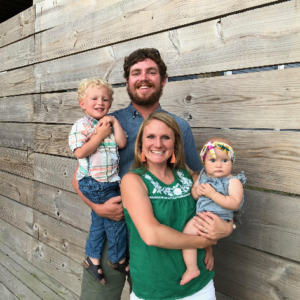
The Harrises
“We have stand-up paddle boards, we have single and double kayaks, and canoes. You can rent them anywhere from an hour to all day. We see lots of families coming out or people trying this out a first time or a group of girls coming out looking for something fun to do. Our clientele for rentals is very widespread!
What’s awesome about kayaking, paddle boarding or canoeing – you can do it when you’re older. It doesn’t require a lot of physicality to do it. Anyone can do it!
We have infant life jackets. My niece that’s going to turn one soon – she’s gone out of couple times. We just put her in a little infant life jacket and she just sits right in front of you. My boys love it.
The rentals are so accessible. Our staff gets you set up, they get you your lifejackets. They show you how to hold your paddle; they show you how to do different types of strokes and they help you get on the water so it’s so accessible for anyone. For families, for groups, for kids of all ages; it’s so great.
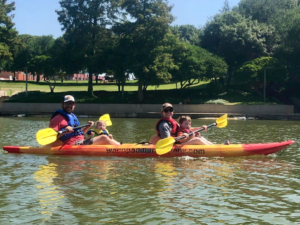
Sarah + her family (Ben is husband)
Along with our rentals, we’ve been doing night paddles on Friday nights. You go out from 8-10PM and watch the sunset on the river. Paddling at night time is just a different type of adventure because it’s dark. But, in downtown Waco all of the bridges are lit up and you’re paddling by the light of the suspension bridge.
We’ve had people come out for every single one and they get off the water and say, when’s the next one? We’ll see you then! It’s just different. It’s so peaceful. There’s even less ambient noise out there. It has a different feel to it.”
What about for kids?
“We did camps this summer. (It probably doesn’t hurt that it’s like 100 degrees outside!)
The kids learned how to operate all of our different watercraft – kayaks, canoes, and stand up paddle boards – but in a really fun way. They played Capture the Flag and did races to practice the paddle techniques. They did an extended paddle trip down the Brazos. They put in at the MCC dock and they would spend the entirety of that day paddling back to our dock.
EVERYONE loved it. We got great feedback from all the parents. We ended up with about 10 kids per session. We would do up to 20 kids per session, but we’d never have a ratio beyond one staff for every five campers.”
What’s new for Wacoans and Waco Paddle Co.?
We’re planning on offering paddle trips to EVERYONE on Saturdays this fall. Kind of what we did for kids’ camps, but we’re going to do a different put in location. People would come to Waco Paddle Company and we would transport everyone and the boats to a put in location.
It takes paddlers out of the totally urban realm and takes people into more adventure. When you paddle on the Brazos, you don’t see any homes or things like that, it gives you a good sense of adventure.
 Beth Whittington remembers sitting on the Waco suspension bridge as a girl, visiting family friends. Legs dangling off, watching the Fourth of July fireworks spark the sky. Been a Waco local for the better part of 19 years. Gaps explainable by the awkwardly untrue term of “ex-missionary.” Beth thrives on: generating ideas + copywriting. Can’t wait to: visit South Africa. Favorite part of Waco: Bangkok Royale + the HOTHTC. Wants: everyone in Waco to get Towny because it’ll make life better for us all if we let it.
Beth Whittington remembers sitting on the Waco suspension bridge as a girl, visiting family friends. Legs dangling off, watching the Fourth of July fireworks spark the sky. Been a Waco local for the better part of 19 years. Gaps explainable by the awkwardly untrue term of “ex-missionary.” Beth thrives on: generating ideas + copywriting. Can’t wait to: visit South Africa. Favorite part of Waco: Bangkok Royale + the HOTHTC. Wants: everyone in Waco to get Towny because it’ll make life better for us all if we let it.
Take your local support up a notch – pop in Towny + have a look around.
The Act Locally Waco blog publishes posts with a connection to these aspirations for Waco. If you are interested in writing for the Act Locally Waco Blog, please email [email protected] for more information.
By Madiha Kark
Young men of color face challenges every day; they strive to be seen beyond their stereotypical portrayal as depicted by news media and pop culture. Especially in higher education, their representation is small, and completion rates have been historically low. At McLennan Community College, the Men of Color Success Initiative focuses on engaging in individual and group mentoring to address challenges for first-generation students, traditionally underrepresented groups, and students in need of academic and personal direction.
The goal of the program is to increase higher-education completion rates among men of color while raising awareness of issues with diversity and equity, and creating awareness of support services available. The initiative is modeled after similar programs at other colleges in Texas, and representatives are working closely with the Texas Education Consortium for Male Students of Color to grow its efforts.
According to a study by the Center for Community College Student Engagement (CCCSE), titled Aspirations to Achievement: Men of Color and Community Colleges, “Consistently and unmistakably, data show a persistent gap separating Latinos and Black males from other student groups on measures of academic progress and college completion. These gaps exist across higher education.”
Barron Lowe, who graduated recently with an associate degree in communications, said before he found the initiative, he was going through personal issues and wasn’t sure where he was headed in life. A trip to Austin to attend a seminar for the Men of Color made him realize he wasn’t the only one with problems.
The program pairs faculty members and mentors with students to help them achieve personal and academic goals. The idea is to be accountable and push each other to better ourselves. Lowe says the networking opportunities he has had because of the initiative helped him to reach the next level in his life. He is currently working as a leasing agent for a community center but wants to get a bachelor’s degree from Texas A&M. “I’ve met some of the most amazing men through this, and they’ve helped me be the best version of myself.”
Building networks and relationships is a big part of the initiative, and one that allows the group members to make stronger ties, because everyone is invested in the common goal.
“It gave me the opportunity to have a professor who was good one-on-one and really caring, and saw I had the potential to be a better student,” Lowe said. “He basically took me under his wing, and it’s been like this ever since: close.”
At a time when one might feel like they’re taking on the world alone, college can be daunting, he said. Lowe had to learn how to ask for help when necessary, something he couldn’t bring himself to do before MCC, he said.
Click here and learn how you can be a part of the Men of Color Success Initiative at MCC.
 Madiha Kark is a Marketing, Communications and Photography Specialist at McLennan Community College. She holds an M.A. in Journalism from the University of North Texas. She loves to travel, cook, and read nonfiction books.
Madiha Kark is a Marketing, Communications and Photography Specialist at McLennan Community College. She holds an M.A. in Journalism from the University of North Texas. She loves to travel, cook, and read nonfiction books.
The Act Locally Waco blog publishes posts with a connection to these aspirations for Waco. If you are interested in writing for the Act Locally Waco Blog, please email [email protected] for more information.
As the hot summer of 2018 comes to an end, we reflect on our adventures in the growing arts community and look at what’s coming for the fall months.
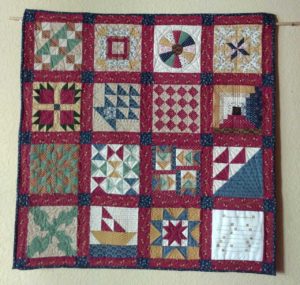
(Underground Railroad Code Quilt by Jamie Graham)
In June, Central Texas Artist Collective (CTAC) kicked off the summer by creating the BLACK BOLD exhibition. It was featured at the Juneteenth Family Fun Day event. We asked the artists to create artwork that reflected on African American’s forgotten history through today’s Black Culture. The artistic visions from everyone’s point of view with historical accuracy through research and modern-day reflections were encouraged. The turn out was small, but the artwork was stunning. Several pieces honored musicians like Bob Marley, Jimi Hendrix, and local favorite, Byron Swan. There was pop style piece of Dr Martin Luther King, Jr that was created in bold hues of blue. One unique mixed media piece was created out of rice, beans, and lentils that depicted the portrait of the first female Buffalo Soldier, Cathey Williams. Another woman’s first piece was a tribute to the first female African American to receive a pilot’s license and was affectionately called Queen Bess. My favorite piece was a thoughtfully crafted Underground Railroad Code Quilt. Each square would safely guide the traveler to their destination and on to freedom. This exhibit created an educational experience that enhanced the Juneteenth celebration weekend and continued to be shown downtown at Klassy Glass, on Austin Ave. Our hope is that it would inspire or encourage viewers to continue discovering and to create their own artwork.
The comic and pop culture community continue to thrive and gain momentum in Texas. CTAC members travelled south to Austin, TX for the Greater Austin Comic-Con. If you have never been to this type of convention, you can expect to see attendees in the thousands fully embracing the vibe of the comic and pop culture environment. You will find a variety of original artwork by the creators themselves, fan art, crafts, costume designers, actors, cosplayers, and so much more. The best part for CTAC was holding space for a talented team of artists, known as Fan Addicts Waco. They have banded together to put their style of comic and pop art in front of viewers at GeekFest in Killeen, TX and at the Bell County Comic-Con in Belton, TX. Locally, the Fan Addicts Waco bunch holds art exhibits at Bare Arms Brewing, on LaSalle Ave. The current exhibit, which started September 15, features Anime fan art.

Photo by Steve Veracruz; Left to Right: Joel Colosimo, Armando Ramirez, Shay MacMorran, Josh Bueno
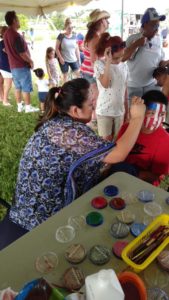
Photo by Steve Veracruz
It was nice to give back to our community in July. Several CTAC members helped Doreen Ravenscroft of Waco Cultural Arts Festival, by providing face painting at McLane Stadium for the 4th of July festivities. It was a lot of work and fun!
Then, First Friday in July, the Pop and Comic Art Exhibit opened at Cultivate7Twelve. This was the first time CTAC collaborated with Cultivate7Twelve to co-curate an art exhibit that took over the two downstairs gallery spaces. We had been talking about it since December; even though the curators changed several times. In the end, together we produced an exhibit to remember. While CTAC focused on new and emerging artists who have spent most of their lives creating comic art; Cultivate was able to reach more established artists to fill in the traditional pop style of art. Both coming together to create a vibrant experience for the senses.

Photo by random person (Thank you so much!)
Also, during the exhibiting month, CTAC featured Rachael Bryant, a multi-talented artist. She led a visual discussion on how to create POP and Comic Art Make-up for Cosplayers and everyday use. Rachel is a rare talent. Anything she can think of, she will find a way to create it. Over the past 3 years, we have seen Rachel use her Special FX artistry to create Superheroes and Villains, the Suicide Squad, and an estranged family trio of Gamora, Nebula, and Thanos.
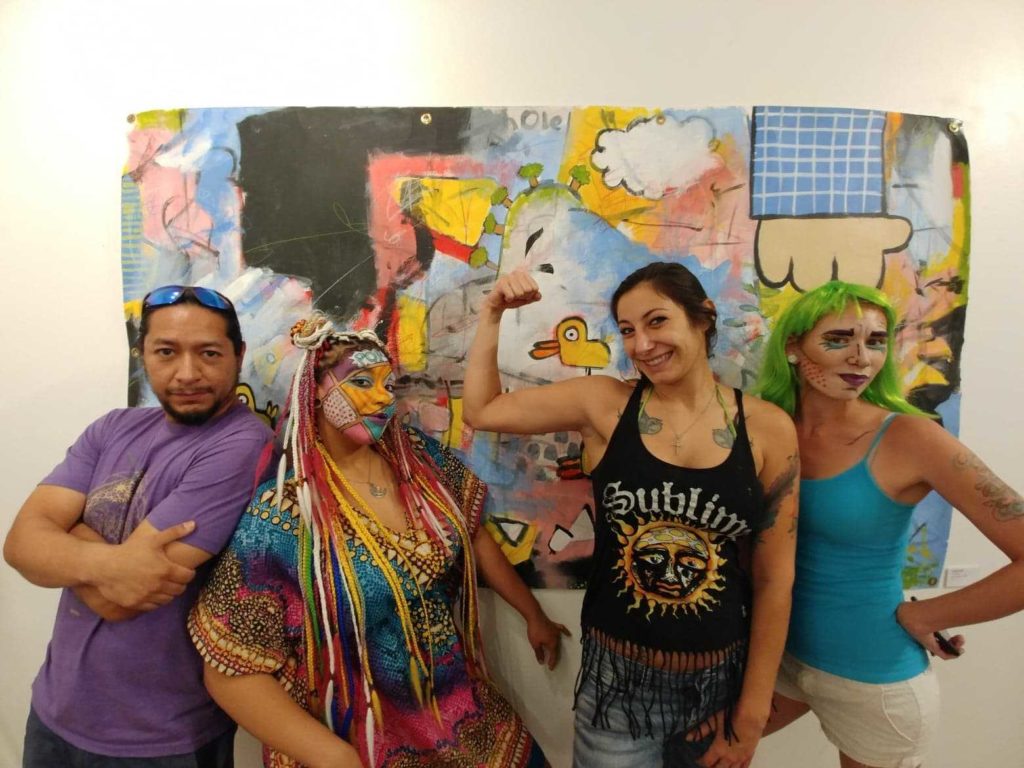
Photo by Angie Veracruz; Left to right: Steve Veracruz, Dani, Rachael Bryant, Natasha West
We wrapped up this one-of-a-kind summer with another trip to Austin for the inaugural MexAmeriCon at the beautiful Emma S. Barrientos Mexican American Cultural Center. As the name entails, this event was specifically created to build up the LatinX comic and art community. Mexican Americans from all over Texas gathered at this convention to share, sell and promote their artwork or their upcoming adventures. Angie Veracruz spoke about what CTAC does for the new and emerging Artist and how the arts community in Waco has seen a renaissance of creativity throughout the City of Waco. She introduced the attending Artists for a panel discussion about their art, their passion to create, and where do they go from here. Concluded by a Q&A session lead by Steve Veracruz. Our day wrapped up with a live performance by Isis Lee.
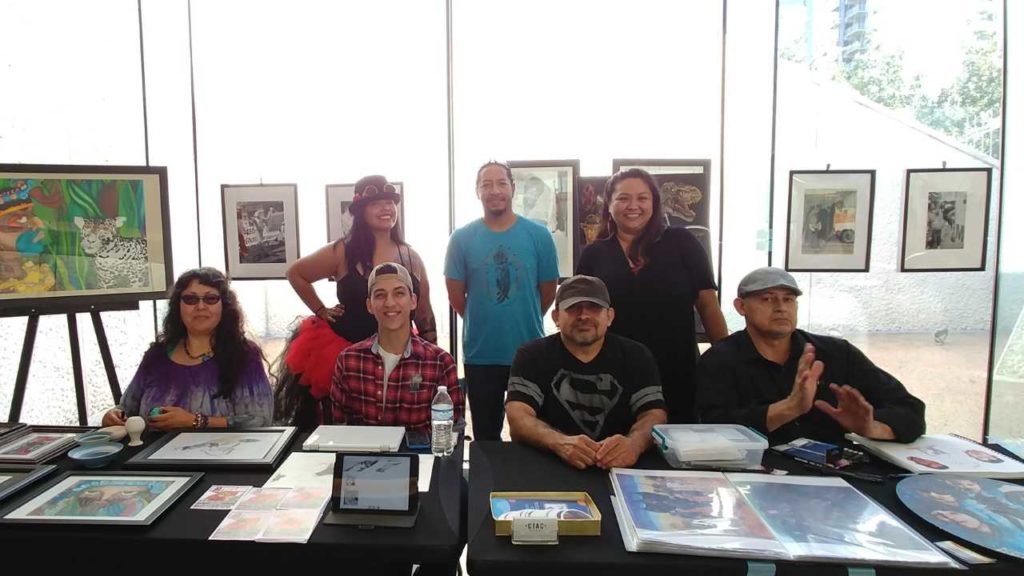
Photo by Jessica Moreno; Front Row: Iris Wamalwa Naka, Joey Gonzales, Daniel Barron, Genaro Barron. Standing: Isis Lee, Steve Veracruz, Angie Veracruz
Upcoming Events and Art Happenings you don’t want to miss!
- Sept & Oct – Independent art exhibits at Klassy Glass, curated by Deborah Reed-Propst
- Sept 15 through Sept 29 – 2nd Annual Climate Change Art Exhibit Reception at the Waco Winery
- Sept 15 – Anime Exhibit at Bare Arms Brewery
- Oct 5, 6 , 7 – Waco Cultural Arts Fest at Indian Springs Park
- Oct 27 – Witchy Woman’s Whistle Fair 2018 at Whistle Stop in Crawford, TX
 Angie Veracruz is an intuitive artist who is influenced by the world around us and reflective insights. She is the mother of three beautiful girls and their biggest education advocate. She is also the Executive Director of Central Texas Artist Collective. She is a member of Texans for the Arts and an arts advocate in the making.
Angie Veracruz is an intuitive artist who is influenced by the world around us and reflective insights. She is the mother of three beautiful girls and their biggest education advocate. She is also the Executive Director of Central Texas Artist Collective. She is a member of Texans for the Arts and an arts advocate in the making.
The Act Locally Waco blog publishes posts with a connection to these aspirations for Waco. If you are interested in writing for the Act Locally Waco Blog, please email [email protected] for more information.
(During these last few weeks of December we will be reprising the Top 10 Most Opened Blog Posts for 2018 from the Act Locally Waco blog. I couldn’t possibly pick my favorites – so I used the simple (cop out?) approach of pulling up the 10 blog posts that got the most “opens” according to our Google Analytics. It is an intriguing collection that gives at least a little insight into the interests and concerns of Act Locally Waco readers. I hope this “Top 10” idea inspires you to go back and re-read your personal favorites. There have been so many terrific ones… If you would like to see the Top 10 according to Google Analytics, here’s the link: Top 10 Most Opened Blog Posts of 2018. Merry Christmas! — ABT)
By Monica Shannon
National Hispanic Heritage Month starts September 15 and continues through October 15 and we have several events in Waco to help celebrate the month long recognition of Hispanic and  Latino heritage and culture. Friday night, September 14, the Centex Hispanic Chamber of Commerce and the Texas Fine Artists group are hosting a Hispanic Heritage Art show and Celebration. The event will include performances by El Folklorico las Estrellas de Waco and Mariachi Azteca de Waco among others, and one particularly special guest… Vann deCordova.
Latino heritage and culture. Friday night, September 14, the Centex Hispanic Chamber of Commerce and the Texas Fine Artists group are hosting a Hispanic Heritage Art show and Celebration. The event will include performances by El Folklorico las Estrellas de Waco and Mariachi Azteca de Waco among others, and one particularly special guest… Vann deCordova.
If you are familiar with Waco history, you will recognize the name “deCordova.” Vann deCordova is the third great grandson of Jacob de Cordova. Jacob deCordova was one of the founding fathers of Waco. He was a man of warmth and he had strong friendships with other founding fathers of the city – men whose names you may also recognize such as Neil McLennan, Jr., George B. Erath, and Captain Shapley P. Ross.
Here is a little of his story.
Jacob deCordova was born in Spanish Town, Jamaica, near Kingston. His parents were British Jews of Spanish descent. He moved to the United States in his late twenties and, among several other endeavors, he became a successful land agent. Through scrip and direct purchase, deCordova acquired large amounts of land to sell to settlers. At his peak, he owned and/or controlled over 1,000,000 acres of Texas land. To attract settlers to Texas, he made speeches about Texas in London, England, New York, Philadelphia and other U.S. cities. His lectures were published on both sides of the Atlantic and were widely read.
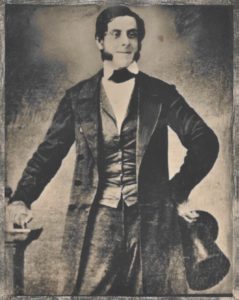 In the mid 1840’s, deCordova was engaged to divide and sell the land on the banks of the Brazos that would eventually become Waco. He hired his friend George Erath to work with him on the project. George B. Erath was a surveyor by trade and did occasional work for deCordova. They had a mutual respect for each other. Erath was deCordova’s most respected surveyor, and George often referred to Jacob as “The Big Man.” Upon seeing the land they had been hired to sell, they agreed that it would make a great location for the city. DeCordova procured the title to the land himself, thend he, Erath, and two other men set about staking out the town on March 1, 1849. Town lots of 1 acre sold for $5 and nearby farmland brought $2-$3 an acre.
In the mid 1840’s, deCordova was engaged to divide and sell the land on the banks of the Brazos that would eventually become Waco. He hired his friend George Erath to work with him on the project. George B. Erath was a surveyor by trade and did occasional work for deCordova. They had a mutual respect for each other. Erath was deCordova’s most respected surveyor, and George often referred to Jacob as “The Big Man.” Upon seeing the land they had been hired to sell, they agreed that it would make a great location for the city. DeCordova procured the title to the land himself, thend he, Erath, and two other men set about staking out the town on March 1, 1849. Town lots of 1 acre sold for $5 and nearby farmland brought $2-$3 an acre.
When McLennan County was established in 1850, deCordova successfully lobbied for Waco to become the county seat. He sweetened his case by donating roads and tracts for public use. He also recruited prominent Texans to move to the town. One of his most successful recruits was Captain Shapley P. Ross of the Texas Rangers. DeCordova lured Shapley from Austin with the promise of business concessions (Ross was given a monopoly on running the only ferry across the Brazos) and several free tracts of land. Jacob deCordova was quoted saying, “Waco was the most beautiful location for a city in all of Texas.” “Most of all,” he said of the future community, “she will be my daughter, and a beautiful daughter she will be.”
In the 1840s, deCordova resided in Houston and helped create the Houston Chamber of Commerce. He also served as an alderman on the early Houston City Council. In 1847, deCordova was elected a state representative from Harris County to the Second Texas Legislature.
In 1849, deCordova and Robert Creuzbaur compiled and published one of the first definitive maps of Texas, a map Sam Houston praised on the floor of the US Senate. Today, the map is registered in the US Library of Congress and is highly praised by scholars and sought by collectors. In 1856, de Cordova published the “Texas Immigrant and Traveler’s Guide Book” to provide complete information for potential settlers. He printed and distributed more than 50,000 copies. Some scholars have credited deCordova with being responsible for bringing more settlers to Texas than Stephen F. Austin. Yet, sadly he gains almost no attention in contemporary Texas history school books.
We are looking forward to hearing a bit more of Jacob deCordova’s story from Vann deCordova Friday night. Hope to see you there!
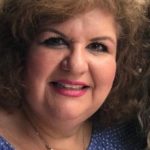 Monica Shannon’s leadership in arts has been instrumental in the developing and emerging presence for the visual arts in Central Texas. Monica has worked with over 100 artists and continues to work in the newly designated Cultural Arts District in downtown Waco. Monica loves travel, but mostly in helping people achieve their goals.
Monica Shannon’s leadership in arts has been instrumental in the developing and emerging presence for the visual arts in Central Texas. Monica has worked with over 100 artists and continues to work in the newly designated Cultural Arts District in downtown Waco. Monica loves travel, but mostly in helping people achieve their goals.
The Act Locally Waco blog publishes posts with a connection to these aspirations for Waco. If you are interested in writing for the Act Locally Waco Blog, please email [email protected] for more information.
By Robert Saucedo
If you are a student looking for a job with longevity, you should look into the concrete industry. If we citizens want to invest our tax dollars into vocational training for trades that have withstood the test of time, then we tax payers and parents should take a serious look at the concrete industry, in particular the precast concrete industry.
The use of concrete dates back to ancient Egypt and shows no signs of slowing down. Concrete is the second most consumed material in the world after water. It’s used mostly in the construction industry. “The precast concrete market is expected to grow from $104.03 Billion in 2017 to $138.96 Billion by 2022, at an estimated compound annual growth rate of 5.96%. The precast concrete market is expected to witness high growth as a result of the rising urbanization, large-scale investments in infrastructure & industrial sectors, and rising construction activities in emerging economies. (Researchandmarkets.com, DUBLIN, May 22, 2018 /PRNewswire/)
I have been in the concrete industry for my entire adult life. It has been a family trade for over 40 years. We in the concrete industry have a passion for what we do, and we take pride in the fact that we are building America daily.
That being said, our industry, like many of the construction trades, is hurting for skilled labor. It reminds me of that old country music classic that George Jones used to sing, “who’s gonna fill their shoes.”
We have a whole generation of kids that are going into college, many of them coming out with crippling debt. Training in the construction industry offers a different path. For example, according to Indeed.com, the average salary for a construction inspector in Texas is $51,693. This is the kind of work that an 18-year old with a little initiative and the right training and industry certifications could do at beginning his or her working career, right out of high school.
We are an industry that is waiting for that next young individual that we can invest in. I can’t help but feel bad for the 18-20 year olds that walk through our doors who can’t read a tape measure. It is great,on the one hand, to teach our young people to use computers and ipads and other tools and technology of the 21st century. But, I believe we are failing our kids by not encouraging them to take trade classes like drafting, shop, and welding.
What can we as Wacoans and Texans do to encourage our youth to enter into these trades? I think that if we offer industry certifications such as ACI (American Concrete Institute)/PCI (Precast Concrete Institute) and then find local companies that would be willing to offer summer jobs for these trades, our youth will not automatically default to student loans and degree programs that will not pay off for many.
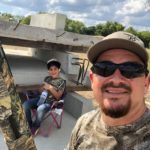 Robert Saucedo is a 3rd generation American (no-hyphens). He grew up watching his dad and uncles build roads and bridges from Waco to Dallas and watching his mom overcome countless obstacles with grit and compassion. He started working in the precast concrete industry 12 years ago. The company that hired him helped him earn his associates degree in business management and multiple industry certifications that have helped him grow in his career. The precast/prestressed industry and committing his life to Christ have been blessings in his life and he has a passion for sharing about both.
Robert Saucedo is a 3rd generation American (no-hyphens). He grew up watching his dad and uncles build roads and bridges from Waco to Dallas and watching his mom overcome countless obstacles with grit and compassion. He started working in the precast concrete industry 12 years ago. The company that hired him helped him earn his associates degree in business management and multiple industry certifications that have helped him grow in his career. The precast/prestressed industry and committing his life to Christ have been blessings in his life and he has a passion for sharing about both.
The Act Locally Waco blog publishes posts with a connection to these aspirations for Waco. If you are interested in writing for the Act Locally Waco Blog, please email [email protected] for more information.
By Elana Premack Sandler, LCSW, MPH
“A suicide is like a pebble in a pond. The waves ripple outward.”
 Many years ago, my colleague Ken Norton, LICSW, director of NAMI New Hampshire, shared this quote, and it has stuck with me. Visually, when you see a pebble drop into a pond, it’s something small that makes a big impact.
Many years ago, my colleague Ken Norton, LICSW, director of NAMI New Hampshire, shared this quote, and it has stuck with me. Visually, when you see a pebble drop into a pond, it’s something small that makes a big impact.
The first “waves,” close by, are big, and as they move outward, they get smaller and smaller. The reach of the pebble’s waves is much greater than the size of the pebble itself.
When someone dies by suicide, the people impacted most dramatically are those closest to the person who died: family, friends, co-workers, classmates. As a result, the people who interacted regularly with the individual who ended their life will miss the physical presence of that person and typically feel the loss most intimately.
But, those people represent only the first wave, or the initial level of impact. Those people who are members of an individual’s community, such as members of a faith community; teachers, staff and other students in a school; or service providers, may also be affected by a suicide.
Some of these people may feel the impact in a way that feels similar to those closest to the person who has died. In a situation where the individual has struggled openly with mental health concerns, those who knew of the struggle will feel the pain of the loss—likely wondering if they could have done more.
People who may not have even personally known the individual who died can also be impacted. Like emergency medical personnel, law enforcement, clergy and others who respond and provide support to the family and community, either at the time of death or afterward.
Ultimately, in the way that a pond is changed because of a pebble, an entire community can be changed by a suicide. According to a 2016 study, it is estimated that 115 people are exposed to a single suicide, with one in five reporting that this experience had a devastating impact or caused a major-life disruption.
So, what can be done to manage the impact of a suicide, and work toward future prevention?
Work To Decrease Stigma
Stigma only leads to silence. And silence about a suicide loss does not contain the ripple effect—it just leaves people feeling isolated, as if they are facing this tragedy alone. When someone dies by suicide, the aftermath opens up an immediate opportunity to talk about suicide as a public health issue that affects all of us. We all have a role to play in prevention and decreasing stigma by sharing our stories.
Increase Support To The Community
The impact of a death by suicide can be vast, as people hear about suicides through the proverbial grapevine. Community hotlines and the National Suicide Prevention Lifeline (1-800-273-8255) should be advertised, and community groups, such as faith communities, may want to convene opportunities for people to come together to mourn and receive support. Peer support from people who have lost a loved one to suicide can be healing—it can be very powerful to know you are not alone and to connect with others who have also experienced suicide loss. The American Foundation for Suicide Prevention (AFSP) maintains a registry of support groups, including a specific list of survivor support groups.
For those who respond to a crisis, providing a way to process a suicide is different, though just as important, as providing support to those more intimately impacted by a death. Crisis responders need space and time to debrief in order to be able to continue to respond appropriately, both in terms of their own reactions and in the way they support those who have lost a loved one.
Help People In Need Access Mental Health Resources
For those struggling with suicidal thoughts, access to mental health treatment can be key to saving a life. If you personally know someone struggling, encouraging them to seek help —even helping them get to that first appointment—shows that you support them.
In the bigger picture, advocating for better insurance coverage for mental health treatment will allow more people to be able to access professional help. Schools, primary care offices and community programs serving people at risk can organize screening programs as long as there are resources in place to be able to effectively refer those at risk to appropriate treatment.
As we witnessed recently, a suicide by a celebrity can have widespread impact. For those who have lost loved ones to suicide, hearing of another death by suicide can be triggering and emotionally draining. For people who have survived suicide attempts themselves, media coverage of suicide may increase their own feelings of suicidality. And yet, paying attention to these deaths increases our collective awareness of suicide as a problem and highlights suicide prevention as a need.
When we grieve together, we realize the impact of one single life—one pebble in a pond.
 Elana Premack Sandler, LCSW, MPH is an Associate Professor of Practice and an Assistant Director of Field Education with SocialWork@Simmons. Since 2009, Elana has been blogging at Psychology Today on suicide and suicide prevention, with a focus on the intersection of mental health and social media.
Elana Premack Sandler, LCSW, MPH is an Associate Professor of Practice and an Assistant Director of Field Education with SocialWork@Simmons. Since 2009, Elana has been blogging at Psychology Today on suicide and suicide prevention, with a focus on the intersection of mental health and social media.
The Act Locally Waco blog publishes posts with a connection to these aspirations for Waco. If you are interested in writing for the Act Locally Waco Blog, please email [email protected] for more information.
By Wendy Cox
If you’ve paid attention to the news over the last 10 years, you’ve likely heard debate around our nation’s healthcare system. In many respects it seems Americans really have a “sick care” system instead.
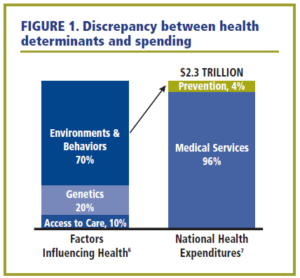
Figure 1. Discrepancy between health determinants and spending. Adapted from “Community Centered Health Homes: Bridging the gap between health services and community prevention,” by J. Cantor, L. Cohen, L. Mikkelsen, R. Panares, J. Srikantharajah, and E. Valdovinos, 2011, p. 4. Copyright 2011 by Prevention Institute.
We visit our clinics most often when we are already sick, and physicians are paid almost exclusively for treating sick patients. This model is financially burdensome (Figure 1). Environments and behavior, which can be changed, are at the root of most illness, and yet only 4% of our $2.3 trillion-dollar healthcare budget is spent to promote health and prevent illness. According to the Centers for Disease Control, chronic conditions like heart disease, diabetes, and obesity affect half of Americans and account for 75% of healthcare spending. Because chronic conditions are preventable with lifestyle and environmental changes around risk factors like diet and physical activity, our current models of care and funding don’t make financial sense. More money should be invested in creating healthy environments that lead to healthy behaviors.
With generous support from the Episcopal Health Foundation’s Community Centered Health Home (CCHH) grant, Family Health Center (FHC) is engaged in creating a more efficient model. A CCHH clinic acknowledges the factors outside of the exam room that affect patients’ health, and actively participates in changing them. FHC is doing this alongside community partners by addressing diet, physical activity, health-harming legal needs, access to green space, and community policy decisions.
 Family Health Center, along with our partners at World Hunger Relief, Inc. (WRHI) have implemented a prescription for produce program. Physicians write prescriptions for fresh produce, and WHRI delivers it to four clinics. Patients then fill their produce prescriptions at their clinic, much like they would pick up medication from the pharmacy.
Family Health Center, along with our partners at World Hunger Relief, Inc. (WRHI) have implemented a prescription for produce program. Physicians write prescriptions for fresh produce, and WHRI delivers it to four clinics. Patients then fill their produce prescriptions at their clinic, much like they would pick up medication from the pharmacy.
 Caregivers from FHC can also write prescriptions for exercise. With exercise equipment and fitness advisors provided by Baylor University, patients redeem their prescriptions at FHC’s Wellness Center located in the Madison Cooper Community Clinic.
Caregivers from FHC can also write prescriptions for exercise. With exercise equipment and fitness advisors provided by Baylor University, patients redeem their prescriptions at FHC’s Wellness Center located in the Madison Cooper Community Clinic.
FHC providers prescribe legal services to patients. Greater Waco Legal Services is teaming up with the Madison Cooper Community Clinic medical group to form a Medical-Legal Partnership aimed at helping patients address their health-harming legal needs as individuals, and on behalf of groups when clusters or trends are identified.
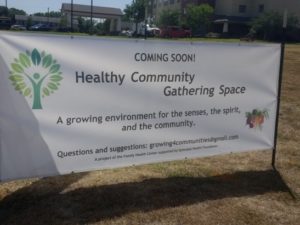 FHC has made property available for the development of a health-promoting Community Gathering Space. Located next to FHC’s main site on Colcord between 15th and 18th, and guided by the expertise of Dr. Aime Sommerfeld-Lillard, this park-like garden space will offer clinic staff and neighbors a place to nurture their physical, mental, and social well-being.
FHC has made property available for the development of a health-promoting Community Gathering Space. Located next to FHC’s main site on Colcord between 15th and 18th, and guided by the expertise of Dr. Aime Sommerfeld-Lillard, this park-like garden space will offer clinic staff and neighbors a place to nurture their physical, mental, and social well-being.
FHC physicians serve on working groups of the Prosper Waco initiative. As part of a “Health in All Policies” approach, FHC physicians and staff are collaborating with other community members to embed health considerations into decision making on a broad range of efforts influencing health.
You’ve read this far, so you must be interested in moving our community from “sick care” toward a more holistic, efficient healthcare system, too! If so, there are several ways in which you can be involved:
- Contact FHC’s Development Director, Carlos Hinojosa, to contribute financially to any of the projects
- Get in touch with Rachel Ledbetter, FHC’s Volunteer Program Coordinator, to learn about ways to volunteer your time and expertise
If you want to learn more about any of the initiatives, see the links below:
Find out more about World Hunger Relief, Inc, Medical-Legal Partnerships, Greater Waco Legal Services, and Health in All Policies.
Watch these videos for more on Community Centered Health Homes and FHC’s produce and exercise prescriptions.
And for a real treat, enjoy Letitia’s story about her experience at FHC.
 After nearly 20 years as an educator, Wendy Cox returned to school and earned a master’s degree in Public Health from Baylor University. She is currently the Community Centered Health Home (CCHH) manager at Family Health Center and spends her days working with clinic staff and community partners to facilitate their work in making our community a healthier place to live. In her spare time, you’ll likely find her walking Waco’s extensive river trails, reading a novel, or watching a movie with her family.
After nearly 20 years as an educator, Wendy Cox returned to school and earned a master’s degree in Public Health from Baylor University. She is currently the Community Centered Health Home (CCHH) manager at Family Health Center and spends her days working with clinic staff and community partners to facilitate their work in making our community a healthier place to live. In her spare time, you’ll likely find her walking Waco’s extensive river trails, reading a novel, or watching a movie with her family.
The Act Locally Waco blog publishes posts with a connection to these aspirations for Waco. If you are interested in writing for the Act Locally Waco Blog, please email [email protected] for more information.
